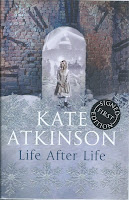Book 51: The Fruit of Stone by Mark Spragg
Book 52: Life After Life by Kate Atkinson
Book 53: The Interestings by Meg Wolitzer
Book 54: The Paris Review, Spring, 2013
Head to the nearest independent bookstore and buy copies of Kate Atkinson's Life After Life and Meg Wolitzer's The Interestings.
You're going to want to read these books, which are certain to make a good many 2013 top ten lists. Life After Life will be a nominee for the coveted Booker Prize and The Interestings will make the shortlist for the National Book Award.
That's how highly I regard these two novels.
Life After Life is the story of Ursula Todd who never draws a breath when she is first delivered in her family's home in February, 1910. First delivered because Ursula is re-born and on this occasion the doctor arrives in time to cut the umbicial cord that's strangling her from around her neck.
Each time she dies -- a drowning, a fall from a roof, a savage beating, a bombing during the Blitz -- Ursula is re-born and her life subtly, imperectibly altered.
Atkinson has always been skillful at weaving together diverse plot lines into a satisfying and coherent whole. Here, she is at her most inventive in this brilliant, compelling novel.
Some have compared the book to the movie Groundhog Day starring Bill Murray. Yet unlike the movie, Ursula doesn't live the same life over and over again. She lives different lives.
(I think it's more like the Marvel Comics that asked "What If . . ." What If Doctor Doom became a hero? What If Wolverine battled Conan the Barbarian? It's a question we've all asked ourselves: What if I hadn't taken that job? Gone to the bar that night? Taken that class? Decided to walk rather than drive?)
Part of Atkinson's brilliance is in the simple recognition that one small change leads to many others; changes we can't anticipate and might like to take back. It's those little changes that lead Ursula's life into directions we can only consider absurd from the perspective of that snowy night she was born, but that now -- looking back -- seem altogether appropriate.
Ursula isn't aware of the changes in her life. Not exactly. There is a nagging sense of deja vu. (In a clever bit of humor one family member quips that "deja vu" was probably the first French words Ursula learned.) She's also led by compulsions, seeminlgy irrational fears and unexplained impulses.
One thread that holds constant throughout Ursula's ever-changing lives is her family. If the changing nature of her various lives unfolds with purpose and toward a single end, it is driven by a love for them.
(As a side note, I can't remember reading a book that so thoroughly documents the horrors of civilian life in London during the Blitz. Ursula's various lives cast her in various roles during World War II, roles that allow us to experience the intermingling of fear and courage exhibited by the citizens of that city to the fullest.)
There are similarities to Life After Life in The Interestings by Meg Wolitzer. Lives don't re-start in Wolitzer's novel, but we do see how uncertain the direction of our lives can be and how one act -- large or small -- can determine the path we go down.
The Interestings is the story of six teenagers who meet at a summer camp for the arts. Without the least irony, they proclaim themselves the Interestings, so convinced are they that they are interesting and certain to live interesting lives.
Yet their lives unfold in unexpected ways. One enjoys great professional success and the riches that success brings. Another, while still a teenager, must flee the country to evade prosecution for rape. The others' lives fall between those extremes.
The Interestings is about regret, about the road Frost evokes -- the one taken and the one not taken -- and it is about learning to accept the hand we're dealt, an acceptance that never comes easily, if at all.
With The Interestings, Wolitzer vaults into the upper ranks of American writers. Here is the book that Jonathan Franzen wanted to write. Closely observed, wry and insightful, its characters treated with compassion and unsparing honesty, The Interestings is the most powerful, accurate and evocative commentary on American life to emerge in years.
---------------------------------
I found something jarring about Mark Spragg's prose in The Fruit of Stone. It felt too stately, too mannered, to tell this story of two long-time Wyoming friends in pursuit of the woman they love. The story of loss and love needed a gritter tone than Spragg's supplies.
The Spring, 2013, edition of The Paris Review is a rich and rewarding read.




No comments:
Post a Comment